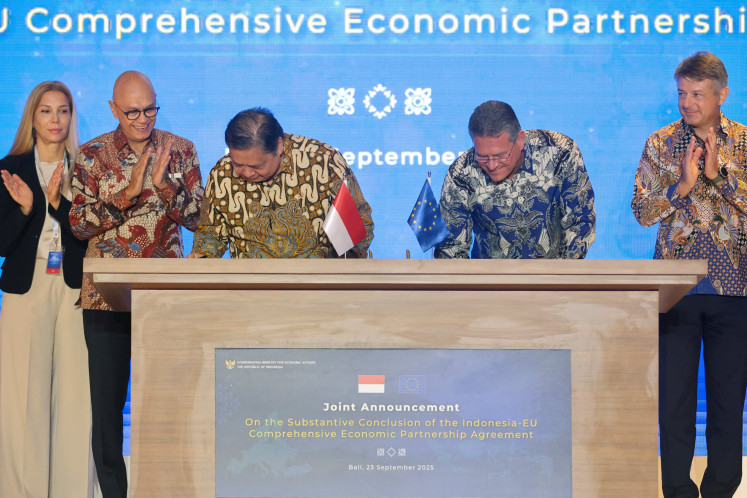Popular Reads
Top Results
Can't find what you're looking for?
View all search resultsPopular Reads
Top Results
Can't find what you're looking for?
View all search resultsEditorial: Surveys on sharia
If the United States is obsessed with gauging its popularity in the world through conducting regular opinion polls with simple questions like "Do you like or hate America?", Indonesia is becoming infatuated with surveys asking the question "Do you support sharia?" The danger with this kind of survey is that it is not only purely misleading, but because it does not provide a comprehensive picture of public sentiment on really complex issues, it could also lead to wrong responses and policies
Change text size
Gift Premium Articles
to Anyone
If the United States is obsessed with gauging its popularity in the world through conducting regular opinion polls with simple questions like "Do you like or hate America?", Indonesia is becoming infatuated with surveys asking the question "Do you support sharia?" The danger with this kind of survey is that it is not only purely misleading, but because it does not provide a comprehensive picture of public sentiment on really complex issues, it could also lead to wrong responses and policies.
In the case of the popularity of sharia, or Islamic law, in many surveys in the past the majority of Indonesians, nearly 90 percent of whom are Muslims, support the introduction of Islamic law in the country.
The latest surveys were conducted by the Setara Institute for Democracy and Peace, an organization known to promote pluralism and equal rights for people of all ethnic, cultural and religious backgrounds. Setara found that more than 56 percent of youths in the Greater Jakarta area support sharia-based bylaws. Earlier surveys on the same issue, including one conducted by a unit of the Islamic State University (UIN) of Jakarta, also found overwhelming support for sharia.
A report by Roy Morgan, a survey company headquartered in Australia, this week reaffirmed the majority support nationwide, with 52 percent of its respondents to a survey saying yes to the question, "Do you support the implementation of sharia in your area?"
The survey went further in asking about well known aspects of sharia: the compulsory wearing of the headdress (jilbab) for women, the cutting of hands for thieves and the confinement of women to domestic issues. Not surprisingly, the respondents who support "sharia" said no 45 percent of the time to the first issue, 40 percent to the second and 24 percent to the third.
Islamic scholars would argue that sharia means much more than the jilbab, the cutting of hands and the place of women in society, so the survey cannot be taken as authoritative. But what the survey does tell you is the complexity of the issue, and it also reveals the glaring flaws of earlier surveys that showed, misleadingly, overwhelming support for sharia in Indonesia.
The survey could have gone further and used examples of conventions in countries that apply sharia or profess to be Islamic states. It could have asked respondents if they supported the idea of no school for girls, as in Taliban Afghanistan, or about banning women from walking in the streets unaccompanied (unbelievably, this is already enforced in nearby Tangerang after 10 p.m.), or about no driving for women, as in Saudi Arabia, or no watching soccer for women, as in Iran.
The simpler surveys on sharia play straight into the hands of Islamist politicians, who have been fighting for the cause ever since the inception of the Republic in 1945. They lost the argument, time and again, for the introduction of sharia because, at the end of the day, Indonesia is a pluralistic state in which people of all faiths are treated equally.
That was the national consensus in 1945 that brought eastern territories where Islam is not the predominant religion -- such as Bali, East Nusa Tenggara, North Sulawesi, southern Maluku and Papua -- into the fold of the new republic. This is still apparently the national consensus today, more than 60 years later.
A national discourse on sharia is certainly healthy for a democratic Indonesia. One school of thought believes sharia and the Koran are sources of the law. Another school says sharia is the law. The jury is still out on which camp will prevail. But in terms of statehood, secular law wins out.
To the majority of Muslims, sharia simply means Islamic law, which probably explains why many respondents in these surveys supported it. No good Muslim would be caught publicly saying he or she opposes sharia. It is actually surprising that the support does not reach 80 or 90 percent. But this goes to show the Muslim ambivalence on the sharia debate.
The real test of how much support there is for sharia is actually the national election, which is also contested by political parties whose platform is the creation of an Islamic state or the introduction of sharia. In 2004, the share of the votes of the Islamist parties that clearly support sharia or the idea of an Islamic state did not amount to more than 20 percent.
The fact that an overwhelming majority of Indonesians still voted for the secular parties shows the prevailing sentiments of the people, Muslims and otherwise, toward the Islamist parties and toward their sharia platforms. Next year we will know better where we stand on the sharia question.










